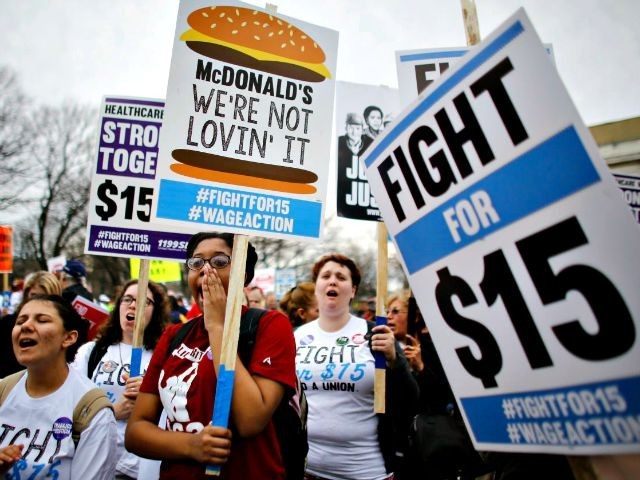The latest economic slogan of the hard left is to push the federal minimum wage to $15 an hour. This would almost double the current federal minimum, which was raised to $7.25 an hour just six years ago.
Democrats universally still support a higher government-mandated minimum wage, mind you. The debate is over how high to government should push.
During his Presidency, Barack Obama has supported increases to $9 an hour and, in the midst of his reelection fight, a hike to $10.10 an hour.
The push for an increase to $10.10 an hour was so widespread across the left, in fact, that the Congressional Budget Office last year issued an analysis of the economic impact of such an increase. Unsurprisingly, the CBO found that the hike would cause half a million Americans to lose their jobs.
The CBO analysis found that about 16 million Americans, who currently earn somewhere between the current minimum and the new $10.10 hourly wage, would see an increase in their earnings.
So, using the most conservative estimate of possible job loss, a little over 10 percent of those with jobs would see some kind of benefit.
Those who would receive a benefit are not the caricature portrayed by the media. The average family income of a minimum wage worker is $53,000 a year, far above the national poverty level. This is simply because most minimum wage jobs represent a second or third job within a family. Only 4 percent of minimum wage workers are a single parent working full-time. About half of minimum wage workers are under 25.
A far better way to assist low-income workers struggling to raise a family on a minimum wage job is a boost in the Earned Income Tax Credit, which rewards those working. A job, even a minimum wage job, is still the best anti-poverty program. More than two-thirds of minimum wage workers receive a raise within the first year of employment.
A minimum wage is really a starter wage. As employees gain more skills and experience, they move up the job ladder. A government mandated increase in the minimum wage makes these first jobs more expensive for a business to offer, so there are fewer.
The negative consequences are far greater than simply the loss of 500k jobs. For many, those eliminated jobs were their first entry-point into the labor market. Low-skilled workers may have just enough knowledge to fill a $7.25 an hour position, but not enough to fill one at a higher minimum wage.
There is a great deal of debate over how extensive job losses are from a government increase in the minimum wage. Both sides of the debate tend to exaggerate the economic impact. The reality is that few Americans earn anything close to the minimum wage, so the macro effects aren’t enormous.
The human effects on those who can’t find a job at the higher wage level are enormous, though. That cost doesn’t fit into a slogan though.
This new push for $15 an hour seems to have come out of a union-backed effort to raise wages for fast-food restaurants across the country. This is part of a long-standing union effort to organize these businesses. Federal minimum wage levels don’t apply to union collective bargaining agreements, after all.
Democrat Presidential candidate Bernie Sanders has embraced the $15 an hour level. Frontrunner Hillary Clinton has endorsed this wage level for fast-food restaurants in New York City, but has been silent on what the federal minimum wage should be outside of the Big Apple.
Congressional Democrat leadership is backing an increase to $12 an hour, as is President Obama currently.
Republican Leadership is opposing an increase but, if history is a guide, will eventually go along with a more modest increase. Conservatives will, as always, oppose an increase as the bad economics that it is, among other valid reasons. Of course, given their treatment by most business organizations in Washington, conservatives may want to rethink how strongly they want to oppose an increase.
Like most political slogans, an increase in the minimum wage polls very well with the public. There is little evidence, though, that many voters actually base their decisions on the issue.
Still, there is a certain morbid pleasure in watching the Democrats trying to outbid each other in their political appeals on the issue. Given that Democrats are preternaturally wired to spend other people’s money and dictate how they should run their lives, one wonders why Obama and Congressional Democrats are being so coy.
It certainly raises the question: if $10.10 an hour is so obviously a good economic policy, why not $15 an hour? Please show your work.

COMMENTS
Please let us know if you're having issues with commenting.